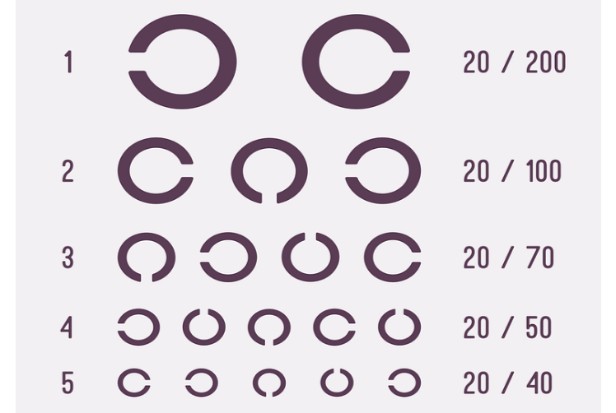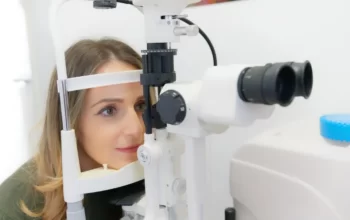
If a doctor tests your eyes and the results show that you have 20/30 vision, it means that your vision is marginally worse than a person with normal eyesight (20/20).
The distance between an object and a person with 20/30 vision must be shortened by 10 feet.
What Does 20/30 Vision Mean?
You will be asked to identify letters during your eye exam so that the eye doctor can gauge how well you see.
How does 20/30 vision work? It means you can see things from 20 feet away that the majority of people can only see from 30 feet away. This indicates that you may need vision correction because your eyesight is subpar.
The American Optometric Association (AOA) states that 20/30 vision may, in some circumstances, be a sign of low vision. You may have some vision loss if, when wearing your prescription glasses, your visual acuity is between 20/30 and 20/60.
What is the Difference Between 20/20 and 20/30?
Even though 20/30 vision is nearly 20/20, normal vision can be achieved without significant correction. Clear vision is required for those with 20/30 vision. However, people with 20/20 vision can see clearly without glasses.
Is 20/30 Vision Good?
20/30 vision is not necessarily bad. It simply means that you can’t see as clearly as the average person, as we mentioned above, but this is nothing serious and doesn’t always call for prescription eyewear.
If your job requires 20/20 or nearly 20/20 vision, then you may need glasses for 20/30 vision. For pilots and people who travel the nation for a living by car, this is frequently the case.
When is 20/30 Vision Not Enough?
Although having 20/30 vision denotes a reduction in optical power, it does not indicate that you are going blind. Simply put, it means you require assistance with your vision to complete some tasks in your daily life without too much difficulty.
With a 20/30 vision, you can still do the following without assistance:
- Normal household chores
- Read in moderate light
Instances, where 20/30 vision can limit you from conducting some activities, include:
- Driving at night
- Telling colors apart
- Flying planes
- Working in some jobs such as the police force
- Using your electronic displays such as the television and computers
When Do You Need Glasses for 20/30 Vision?
Your symptoms of vision loss and refractive errors (such as astigmatism, hyperopia, or myopia) will both play a role in whether you require glasses to achieve 20/30 vision., astigmatism, hyperopia, myopia, and presbyopia). Since they can prevent your eyes from focusing light on the proper area of the retina, refractive errors can affect your prescription.
Investing in corrective eyewear would be worthwhile if you feel that your vision is interfering with your daily activities. Conversely, if your vision isn’t a problem for you, glasses might not be required. Asking your optometrist for advice is the best course of action.
Are you unsure if wearing prescription lenses is the right choice for you? Ask yourself these questions:
- Is my headache frequency increasing?
- Do I ever have hazy vision?
- At what distances is it challenging to see?
By asking yourself these questions, you can find out how your refractive errors affect your prescription and decide whether or not glasses are necessary.

Do You Need Glasses, Corrective Lenses Or LASIK Surgery for 20/30 Vision?
20/30 vision does have an impact on your lifestyle, and it may keep you from landing your dream job. However, it would be best not to stress so much about your low vision as there are different ways the physicians can correct your 20/30 vision:
Correct 20/30 Vision through LASIK Surgery
Different eye conditions that lead to low vision can be treated with Lasik, a kind of laser eye surgery. You won’t need to wear glasses after the surgery to see clearly.
Your 20/30 vision may be improved with LASIK. However, there is no assurance that after the procedure, your vision will be corrected. It’s possible that you won’t have perfect vision. However, it is extremely unlikely that your 20/30 vision will get better.
Not everyone is a good candidate for the surgery. Some factors that might disqualify you from getting LASIK are:
- You are younger than 18 years old
- You have pre-existing eye ailments
- You have an active career or job, such as police service
- You consistently play certain sports such as wrestling or boxing
Correct 20/30 Vision With Eyeglasses
The most secure and cost-effective method of 20/30 vision correction is by wearing glasses. About 75% of adults who wear glasses improve to normal vision, according to the American Academy of Ophthalmology.
Thus, one of the best ways to treat low vision is with glasses. Farsightedness is another issue that spectacles can help with.
Correct 20/30 Vision With Contact Lenses
Another option for 20/30 vision correction is contact lenses, particularly for those who dislike wearing glasses. Despite costing more, contact lenses function in a similar way to glasses. The lenses are suitable for people who engage in a lot of physical activity throughout their lives.
What is Perfect Eyesight?
Depending on how you view it, this may or may not be true. The majority of people mistakenly believe that 20/20 vision is the best possible vision, but this is not the case. In fact, if you can correctly read the tiny letters on the eye chart when they are placed 20 feet away from you, you can achieve 20/15 or even 20/10 vision.
Some people believe that having perfect vision eliminates the need for glasses, so if that describes you, congratulations! However, if you have a vision issue, glasses are nothing to be ashamed of and can quickly restore your vision to 20/20. (You can also choose contact lenses if you don’t want your friends to see that you wear corrective lenses. Numerous affordable and simple-to-use contact lens options are available from For Eyes.)
Maintaining regular eye exams is the key to obtaining the best vision. To check your visual acuity and make sure nothing is wrong with your eyes, your optometrist will administer a battery of eye exams. In order to keep track of any vision changes, they will be able to monitor your eyes over time.
Summary: 20/30 Vision
Most people aim for 20/20 vision, or average vision. So what does 20/30 vision mean? It’s lower even though it’s not too far below average. It implies that what you see at 20 feet is also visible to people standing at a distance of 30 feet.
For 20/30 vision, do you require glasses? Your prescription and eyesight play a role in this. Wearing glasses is a great solution if your vision is interfering with your daily activities. If you have a refractive error, such as astigmatism, corrective eyewear can also help you by improving your vision at different distances.
You and your optometrist will ultimately decide whether you need glasses. Inquire about the appropriateness of prescription lenses for your 20/30 vision prescription during your eye exam.



